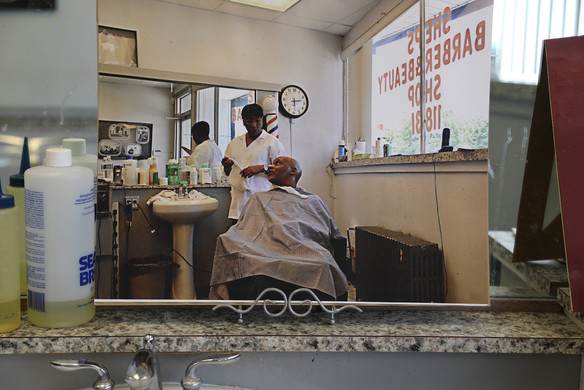Table of contents
Highland Park, Michigan, isn’t what it used to be. That’s what Dorothy Harris Grigsby, current owner of Shep’s Barber and Beauty Shop, thinks. Highland Park was once characterized by beautiful homes and tree-lined streets. Today, many of the homes are abandoned or gone altogether, the local high school has shut down, and vacant lots pepper the landscape. But through it all, Shep’s has endured.
Small businesses such as Shep’s are more than the products and services they sell and the money they make. These businesses and the communities in which they reside are inseparable.
As the past few decades have seen young, talented people leave their hometowns in search of new opportunities, small businesses — whether they have five employees or 50 — remain an important anchor in the community. In fact, 35 percent of those who have remained in their hometown agree that multigenerational businesses are a stronghold of the community, according to a survey done by Square. Fifty-six percent of these residents say they are more likely to trust a local business if it has been around for a long time.
But maintaining these businesses is not always easy. Businesses and communities alike must weather hard times. And sudden changes within the business, such as a succession, can create instability. But both with and for the community, small-business owners find a way forward — they adapt, reshape, and rethink their role.
It’s this shared history — the highs, the lows, the resilience — that creates a lasting legacy, a story to pass down, and businesses to cater to successive generations.
A stronghold of the community
Businesses that have been in operation for decades become part of a community’s fabric and personality. Shep’s is just one among countless businesses in U.S. towns that has survived — remaining in Highland Park since its inception in 1944.
Dorothy recalls that when her uncle, Richard Shepherd, started the business, it was a little storefront barber shop. In 1965 he added the beauty shop — extending the business’s reach and ingraining it further into the community.
“You can go to city hall, the police department — everybody knows Mr. Shepherd. I don’t believe it crossed my uncle’s mind to ever leave. This is where he started, and this is where he wanted to end,” she recalls. “I’m more or less carrying out his legacy. I don’t want it to fail — not on my watch.”
Likewise, Sciabica’s California Olive Oil is integral to its community in Modesto, California; generations of residents have fond memories of its founder, the grandfather of current vice president of sales and marketing, Jonathan Sciabica.
“Chefs remember him walking into their kitchens in their restaurants; they remember him driving around in his van with the olive oil in the back. Everybody remembers that, especially here in Modesto, and they continue to tell me about their experiences with my grandfather,” said Sciabica. “It’s important for me to ensure that we live up to that expectation of what he had built with the community here.”
But the value of these businesses to the community is about much more than just the products they sell. It’s about the connections and opportunities for learning and exploration they provide, not to mention their economic contributions to their communities. Some businesses use their history in combination with their skills to do good and serve their community and customers in new ways.
Today, Sciabica hosts an annual warehouse sale for local artisans to sell their goods. “I love when our customers are using other local products. It creates an environment of appreciating what we have here.” He also allows locals to bring in their own olives so that he can make oil for them — fulfilling an Italian tradition and demonstrating his commitment not only to his own product but to the craft and the community.
At Shep’s, Grisby will cut hair for people who don’t have money and hosts open houses at the shop to feed hungry people in the community. “We’re here not only to make money but to serve the neighborhood.”
Lucas Tatham and his partner, Trellis Smith, own Modern Homestead, a family nursery in Reedsville, West Virginia. Recently, in addition to running their business, they’ve been working to rejuvenate the community in other ways. “There were a lot of vacant and abandoned buildings,” said Tatham, “and we just decided that we don’t want to live next to that.” So the couple will buy a house and restore and refurbish it, hoping that the buildings can still be used for another generation.
Go Fish Go Hunt, based in Middletown, Ohio, has been active in its community by teaching children how to fish. Garrett Williams, whose mother, Nancy, gave him the bait shop in 2008, reinvigorated a community tradition of hosting fishing events for local children. Williams grew up attending such events, but they were eventually discontinued because of a lack of funding.
Williams now sponsors numerous yearly fishing events, including the annual kids’ Fish Derby, where he provides fishing rods to all the kids who participate, and teaches the kids the basics of being outdoors. “I know that doing that one time for that kid or that family that might not have anything could change something for that kid.”
Williams also makes a practice of helping youth in the community set up their fishing lines. “They love fishing, but they have no clue how to hook up any of their stuff,” he laughs. “We do it on the house. We do it because that’s what a shop is supposed to do — take care of its people.”
By engaging the community — not just with their products — these businesses live their values and ensure they remain a stronghold of their community.
Preserving for the community
But remaining a part of the community isn’t always easy. Through good economic times and lean periods, the resilience of small businesses serves as a beacon of hope to the community. It is this connection that leads business owners to sacrifice and work to remain in existence — not just for themselves but for the good of the community.
Shep’s has persisted as Highland Park has changed and deteriorated. “It’s been a hard couple decades because we had many break-ins,” said Grisby. “There was a time we had to endure gunshots and things like that.” Still, she stayed, noting, “This is where people know you.”
In fact, Marlon, a member of the local police, will come by when Grisby is closing the shop late at night and make sure she and everyone else gets in their car safely. Even though maintaining the business in Highland Park required her to invest a lot of her own money, Grisby has stayed committed. “My uncle worked so hard all of those years. I feel like I can also work hard and keep this.”
One of the benefits of being a small business with history is that people in the community know and trust the business. In fact, 42 percent of people who live in the town they grew up in see local business owners as trusted leaders in the community. Many proprietors have built on this trust, finding fresh ways to connect with their communities or reinvigorating traditional ways of engaging.
Technology, in particular, can be useful to broaden a company’s reach, connect with new generations, and offer another platform from which to share a business’s story.
Sciabica’s Olive Oil is still manufactured largely the same way it was when Sciabica’s great grandfather began doing it. But when Jonathan joined the business in the 1990s, he helped build the company’s website and began taking online orders — much to his grandfather’s chagrin.
“It drove him crazy that these customers were buying the product on the website and he never got to talk to them.” said Sciabica. So, they began collecting online customers’ phone numbers. “He would call them, thanking them for the order first and foremost, but inevitably try to sell them a cookbook that my grandma wrote. The response was amazing. Our website has become a way to connect with customers that we couldn’t have imagined originally.”
Still, other companies have faced hard economic realities and reconsidered how their community would be best served by them or merely found ways to move forward.
Modern Homestead was once a simple garden center. But when Lucas and Trellis took over the business from Lucas’s parents, they knew they needed to make some changes.
“The garden center business is very short,” Tatham admits. “For 30-some years my parents had tried to make a sustainable business out of something that lasts about eight weeks. We had to be honest and say, ‘What can we do? And what do we want to do?’”
The pair has since reinvented the business, offering guest houses, a coffee shop, a retail store, and an event space. Looking to the future, they will focus even more on accommodations, not only helping the business thrive year-round but also working to bring more people into the community.
Williams has faced multiple financial struggles with Go Fish Go Hunt. Because he added “Go Hunt” to the name of the business, lenders considered it a new business and thus had difficulty qualifying for attractive long-term, low-risk loans. In addition, in 2012 Garrett bought $10,000 worth of bait for the Fourth of July weekend. When a big storm knocked out the electricity days later, he lost nearly everything.
“I’m standing by the tanks, trying to do everything I can to keep the fish alive, trying to run battery pumps. No matter what I did, it was too little too late.” His insurance refused to cover his losses because the items were perishable. “If it’s not one thing, it’s something else,” said Willias with a smile.
Despite the hardship, Wiliams is dedicated to serving his community and doing good — whether it’s by keeping his prices low or providing random acts of kindness in the community. “The only thing you leave behind when you pass is your legacy — a footprint in people’s minds and hearts. And that’s why I do what I do. You’ve got to take care of people.”
Small businesses that serve successive generations become intertwined with their community. They witness children grow into adults and start their own families; they reflect a community’s values; they are sources of pride for a community; and they are reminders of a community’s shared history.
“Over the years, we’ve been something like a watering hole for the neighborhood,” Grisby reflects. “I think this is where our legacy is.”
![]()











